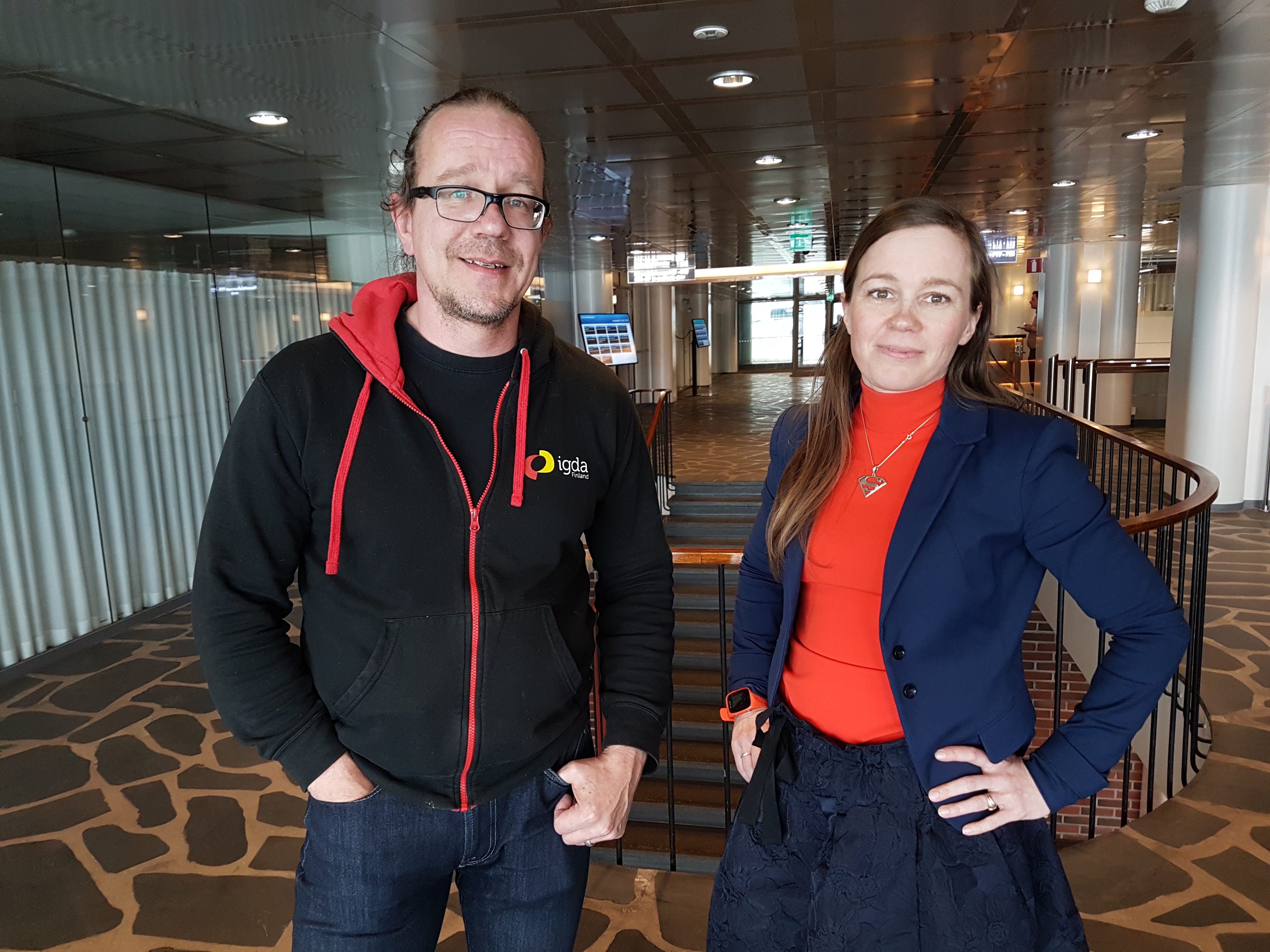Lue artikkeli suomeksi
The game industry is a dream, passion and challenge for those who seek to get there. What kind of reality is the beginner getting into? What kind of abilities does education give on the way to the world’s best game developers? The director of Neogames, KooPee Hiltunen and Business Advisor Suvi Latva emphasize the importance of continuous development, as the only permanent thing in this area is change. Multidisciplinary is a key requirement.

The Director KooPee Hiltunen and Business Advisor Suvi Latva from Neogames. Photo: Minna Kilpeläinen
By networking into the field and business
Neogames is an umbrella organization for the Finnish gaming industry, which promotes the common interest of both education and industry as a whole. Neogames include both the Industry association Suomen Pelinkehittäjät ry (Finnish Game Developers Association) and the vast majority of gaming educators. Neogames surveys the industry’s demands and trends and serves as a source of information on networking in the field. The latest catalogue of the field´s training was published at the beginning of this year.
KooPee Hiltunen considers networking as an important fairway for the industry. In Finland, gaming communities are international, which gives a wider perspective to the field also abroad.
“As the gaming field is global, overall networking outside the borders is also a key factor,” says Hiltunen. “It goes without saying that being a part of the gaming communities, like by working as a volunteer in Finnish Game Jam or IGDA’s, pushes the people into the industry”, he says.
Hiltunen is enthusiastic about the competition and networking event of new student games, Bit1, which gives more opportunities not only to create fruitful contacts, but also to test their skills.
“In general, everything that enables benchmarking, in a way that you compare and evaluate your skills with others, is welcome. You see what our team does and what the other team does, what we do well and what they do well. You can get the basis to judge what we can do better. “
Competition for students’ games is one of missing steps in Finland towards international competitions. “Bit1 certainly brings visibility. It can be a springboard for bigger events such as Nordic Game Awards”, says Hiltunen.
Towards business thinking
One of the main criteria for the Bit1 Game Award is the commercial potential of the game. Designing a commercially successful game also requires versatile training alongside content production, design and coding. Real challenges and knowledge of business are needed.
“Competitions are, in all respects, a way to challenge yourself and to do something with a challenging goal. When you want to compete, it’s not yet a business, but it’s goal-oriented activity”, says Hiltunen.
Hiltunen and Latva are calling for projects in which the schools collaborate with visitors from working life. Providing quick product development projects and finished products gives you the experience of completing a professional process. In order to make games as an entrepreneur, you need to have comprehensive knowledge about the business.
“Yes, you should be able to make excels. It can be really challenging to be able to make realistic budgets and business plans. Although it is difficult to make any predictions, you need to learn how to evaluate whether one’s game development is worthwhile and whether it is worth it to launch. In product development you should be able to realistically evaluate income streams”, Latva says.
“And in addition to considering the business models of individual games, you should think about the whole company’s profitability calculations”, Latva continues.
“But the basic thing is to know what kind of revenue models there are and how they are succeeding. If most of the mobile gaming net revenue is currently coming from a free-to-play model and not a single-time model, you should get it into account when designing games in school projects”, she adds.
Trends and turning points
One of the key factors for success is also to identify the trends in the industry and be ready to catch on the turning points. According to KooPee Hiltunen, one of the key factors of success in the Finnish game industry was that we were more ready to develop and distribute games via mobile application stores like the App Store and Google Play. In 2016, it was estimated that approximately 7% of the mobile net revenue will come from Finland.
“If you compare our neighbour Sweden, they were only able to launch digital mobile distribution a year or two after we had already been utilized the opportunity utilized in Finland. There are clear points in Finnish game history, where the industry has been able to take a new direction at discontinuities”, says Hiltunen.
“But there have also been failures in the field. We missed the big wave of Facebook games, and we did not get in because we were late”, Hiltunen says.
According to Hiltunen, the XR world is a current trend that is being tested in both small and large companies. Now, however, they are a bit ahead of the time when consumers can easily use VR or AR games. However, the more important thing compared to the devices is to find meaningful and good content.
“VR’s problem seems to be that the market is not really open yet. There is no standard base for the hardware, and consumers have no equipment and devices. We can wait for a couple of years to open the market. Also, the ways VR games are made and what kind of games VR games can be is still not known”, Hiltunen estimates.
“I think AR will come faster than VR. I think that Augmented reality can revolutionize games a lot. It can renew the storytelling of games, but the way how it´s done has not yet been discovered. The link between AR and social media is also very interesting”, Hiltunen predicts.
“When thinking about the trends, it is good to think about what are the microtrends that go fast up and down, which are medium trends that already have some kind of temporal continuity and what are the huge upheavals like digital distribution and existing app stores, and later F2P entry to mobile devices. If Finland were not in the right place at the right time, the Finnish game industry would not be what it is now”, says Hiltunen.
Understanding the user
The most essential thing for the game to succeed is understanding the user experience. Suvi Latva reminds that all earnings-related calculations should be based on user data.
“They are not just intuitive things. Product development does not work so that just by playing, you understand what works. You need to be able to gather and make use of data about what the player does during the game”, Latva says.
“The student game developers, and especially those who have not studied the field, start out with what kind of game they would like to play themselves. Of course, it is very valuable knowledge, but it is just one subjective user experience. If you are doing commercially profitable business, it may not be a large sample enough”, Latva says.
Latva recommends making quick product development circles, for example, in school projects and testing already the beta versions of games. “Then you can get valuable feedback from the users. You can see what the users like and what they dislike, what is essential to develop and what you do not need to use so many resources to.”
Quality training for the needs of the field
According to Hiltunen and Latva, the gaming industry is currently moving so fast that the skills that are of the most needed are not necessarily even taught at the game schools.
“For example, data analysis is a thing that we do not have such a high level of education that could meet the needs what the industry has. And as different kind of jobs increases more and more, training can not even in theory be able to keep up with every need”, says Hiltunen.
However, education is still the best foundation for getting involved with the business. The aim is to develop the quality of the gaming industry so high that it is a merit to be able to say that you have got training in a Finnish game school.
“While Finland is striving to be a famous country of gaming companies, it can also try to be a famous game training country”, Latva says.
According to Hiltunen, the quality of education arises from being aware of the requirements of the industry. Competence must also be able to present with sufficient accuracy and several reviewers.
Hiltunen points out that Finland has many levels of education from folk high schools to universities. Qualitative differences are not in the content of the curricula, but the fact that there are clear differences in the resource.
“Also, the desirability of the schools affects the quality level. If there are a lot of applicants, then there will be more qualifications. It can also appear as level differences. But that does not mean that you can get really good workforce from any kind of school”, says Hiltunen.
According to Latvia, specialization and profiling could help develop game training. At the same time, multidisciplinary training should be offered.
“Students should be exposed to cross-disciplinary studies. You do not have to be even in the same school, as long as you regularly have to work with different fields of studies”, Latva recommends.
The collaborative training experiments of the Chips of Game Skills -project are just in line with these goals.
Constant development
Hiltunen and Latva are reminding that, in order to stay up to date in the field, you must be willing to learn more and more ourselves.
“There is no such thing in the workplace that the employer holds a seminar and everybody is writing notes. To be the best possible employee, you are constantly developing yourself. Searching for information, attending events, and chatting with other professionals”, Latva says.
“You have to accept that education can not always offer the very up-to-date teaching as it is practically impossible. Everything is continuously changing a bit”, she explains.
“The world is no longer such that when you study a particular profession, you stay in there until the age of sixty. It goes so that you are studying something and then utilizing it in the future in many different areas. Probably you will have to do study some more along the way”, says Hiltunen.
You can find your career in many different ways.
“For some, it is a good way to go to work in some company, and for someone else, it is by studying certain things – including IT skills, but to use them in a different industry and develop skills there. However, the competence and vision of the game industry exists through the training and will be needed for another environment. For some, founding a company is the thing”, says Hiltunen.
Hiltunen believes that training and development of competence is not a matter of the school but of the individual.
“It is a matter of the student him/herself, for you can learn in so many different ways. School is a good platform for learning, but you have to have motivation and passion. The most important thing is not what school you went to, but what you have learned”, says Hiltunen.
Writer: Minna Kilpeläinen, MPhil, MEd, communication specialist, freelance journalist
